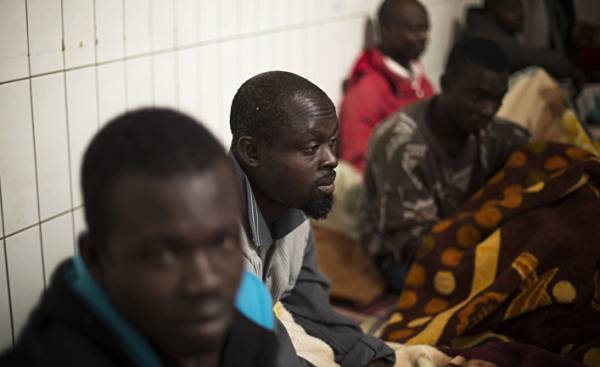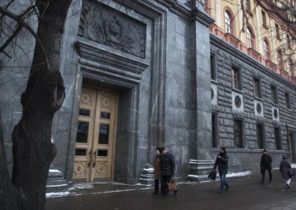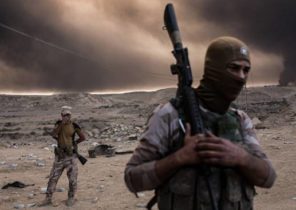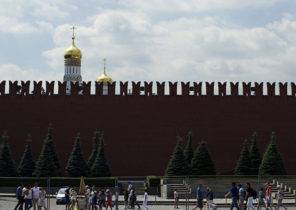
Bogusław dąbrowski (Dąbrowski Bogusław), Franciscan monk from Uganda, says that in the area that it serves (100 kilometers North of the capital Kampala), local youth male only interested in one question: how far away from their villages to the legendary German. In the view of Ugandans Germany is the real land of promise, the country of universal prosperity and happiness, which gives every visitor to her so much money that he could live in peace.
“How many euros you can get a month?” “200 or more”. “And how much is in our shillings?” sounds next question. “One Euro is a 4 thousand shillings,” says his father Bohuslav around and sees the smiling faces of young parishioners. “If here in Uganda, you can survive for 150 thousand shillings a month — think they’re, sort of, getting five times as much, I can live like a king. I don’t have to work, food will be in abundance, it will be possible to start a family”. Ugandans clap and disbelief to the father Bohuslav, who explains that in Germany, not waiting for everyone, and to live and work in their own country.
They don’t want to believe him, because everyone has a friend or friend of a friend, a relative who went to Germany and now lives like a king. So it remains only to save money to move. One day everything will work out.
The demographic bomb
All set to go will fail so my father Bohuslav continues to repeat what every common sense. But even if a small percentage of Africans will be decided on such a trip to Europe will be flooded with migrants. How many are there? One million, five, ten, fifty? No one knows for sure, but the fact that this process will accelerate, clear as day. After all, Africa is a huge demographic bomb. Now live there “only” one billion three hundred thousand people, but demographers warn that by 2050, its population will double.
Few people even remember about the Apocalypse, which promised to become the continent’s AIDS epidemic. HIV prevalence remains the highest here in the world, but because of the growth and natural resistance, prevention and new advances in medicine AIDS — this is not disaster, but problem that Africa is beginning to cope. Migration of the population of the continent is linked with hundreds of other reasons: politics, hunger, climate change. The Sahel dries up, experts say. The population of this region migrates, trying to survive. The constant war also do not contribute to the settlement.
Africa is ready to explode a powder keg, exhibited by colonizers in hot sunlight. In the nineteenth century, paving the colonial borders, no one to worry about the ethnic or religious issues. So now we see the perpetual military conflicts. Post-colonial African state torn apart warring clans and tribes that do not have requirements for the formation of a common state identity.
“Postcolonialism as bad as colonialism, explains Kenyan with a degree from Stanford George ray (George Rae). — Africa is proud of the independence but misses the richness that was taken to Europe by the British, the French and the Belgians. Today’s migration is payback for colonialism”.
Economy
This, of course, only part of the truth. Intensification of migration processes is connected with deep-seated with the minds of Africans, tribalism. A vivid illustration may serve here the most young country of the world — South Sudan, which was freed from the domination of the Arabs from the North a little over six years ago, having won independence. However, the enthusiasm in the young country quickly came on-no. When the threat from the Muslim North has disappeared, at each other’s throats clutched the representatives of the largest — and thus competing — tribes Nuer and Dinka. The result was a civil war and successive crises. And all this in a state that has water and arable land!
South Sudan could engage in economic development, if not an African curse — tribal selfishness. It occurs on its soil, the political conflict was the main obstacle to development and a factor encouraging migration.
Take, for example, Nigeria. This is rich in oil and gas, the country ranks first in Africa for population size. Almost 200 million people creates the national income that is comparable to the volume of Polish: 481 billion dollars (data in 2015). While GDP per capita is 2 640 dollars, that is about four times less than in Poland. In social reality, this means that there are huge poverty and the gap between rich and poor. Corrupt, wealthy and with political influence of the elite is not interested in the real modernization of the country. As a result, the population moved from rural areas to cities that cannot cope with the surplus of workers.
Another factor fuelling migration processes, is the work of Islamist group Boko Haram, which has local Christians. What is the effect? Residents of the relatively rich of Nigeria (in the first two decades of the XXI century, its GDP grew by about 7%) have become one of the largest groups of refugees seeking to reach Europe.
How many of them will come?
The situation in other torn by internal conflict African countries does not look much better. Although in General the African continent is experiencing rapid growth (according to the African development Bank, the consumer spending will grow by 2030 to 2.2 trillion dollars, while in 2008 it amounted to 680 billion), it is doubtful that the growth of welfare will be as fast as the population growth of the Black continent. The more people will be deprived of their prospect of finding work due to the fact that the economy is expanding quickly enough, the higher the risk of an increase in migration processes.
Apparently, the African population boom will happen before you start to work processes that will neutralize the phenomena that contribute to migration. The doubling of the population of Africa is the perspective of one generation. Hope that during this time the continent will be able to establish a lasting peace, to overcome tribal selfishness, and to develop the economy and infrastructure, with this avalanche growing population to stay at home, look clean utopia. So in the coming decades we can expect current migration of peoples. How many people will manage to reach Europe?
To predict this, nobody can. The collapse of the authoritarian regimes of the Maghreb during the so-called “Arab spring” has destroyed the last barrier that separated Europe from the unbridled influx of African migrants. Worse, the atrophy of local government agencies (primarily in Libya) helped to develop the system for illegal transfer of refugees to Europe. Now it has become a business, which feed international and clan mafia.
Europe does not have the power to block the route through the Mediterranean sea. In just one last year this way on our continent got 180 thousand people. Recently, the German development Minister Gerhard Muller (Gerhard Müller) said in an interview with Die Welt newspaper that, according to the estimates of his Department, this year the flow of migrants is at least double. This is a very optimistic forecast. In 2016, the politician predicted that the next decade in Europe will be 8-10 million Africans. Even more pessimistic is the President of the European Parliament Antonio Tajani (Antonio Tajani): he believes that there will be 30 million.
This certainly is the share of rhetorical exaggeration, however, most countries of Europe, which is threatened by the influx of migrants, preparing for the possibility that they will have to take a lot more people than now. Our Western neighbors suggest that in 2017, Germany will be home to about 400 thousand migrants from Africa.
How can we defend ourselves?
Germany encourages the European Union to establish close political, military and economic cooperation with African countries. According to Mueller, the key to solving the immigration crisis could be the creation of the assistance programme for the African economy. This is the key and at the same time the most difficult aspect. Attempts to negotiate with partners in Africa on the introduction of the naval blockade on the example of Ankara is doomed, apparently, to failure. The most precarious element in this design acts as Libya is a country of rampant anarchy, war, and monstrous corruption. While the smugglers can easily earn tens of thousands of dollars to smuggle hundreds of people to gain control over the situation will not succeed. We remain the only long-term strategy of cooperation with African partners in different fields offered by Germany.
The most important area is, of course, by the economy, but rampant corruption, dubious interests of the tribes and clans and endless military conflicts will be for European investors a serious problem. For long-term investment requires political stability, and it is in many African countries can not count.
Much better than European investors in African conditions feel Chinese. The main factor here is not only the scale of investment, but also (or even primarily) regional political agreements. The Chinese have become the largest investors in Africa (recently many hundred million dollars they built in Kenya new railway connecting the East with the West), and to blame them in this difficult.
Time economy can contribute to the inhibition of migration processes, this means that every dollar invested in the Chinese expansion in Africa is the extended Europe a helping hand. However, to our continent you can’t rely on the Chinese. He will have to follow suit and boost investment in infrastructure and business, to help Africa to modernization and to maintain it in the political sphere, including actively connecting to suppress the hotbeds of riots and terrorism. Their elimination and the overlap of marine migration routes is also a way to ease migration.
The Polish aspect
I fully understand the fears of the Polish leadership, which, like everything else in Europe, fears of uncontrolled migration from Africa and the Middle East. Poland not ready for it, she has no money for the refugee resettlement programme, for the placement and integration of tens of thousands of people in the country. The scale of the problems in Germany looks scary. The Polish government probably followed the efforts of Berlin, unsuccessfully urging migrants to settle in rural areas. They, unfortunately, choose the city in the first place — places where their compatriots that starts the process of ghettoization. One in Hamburg in 2016 for the refugees spent 900 million euros. The effectiveness of such programmes in Poland would have been probably even more questionable.
But this is one side of the coin. The second is the need to take part in the fight in Europe with the issue of migration and the creation of plans for the future. I was under the impression that in this area of Poland fell into a political stupor. Representatives of the ruling party don’t seem to realize that existing in a globalized world, the process is inevitable, otherwise the society would receive less primitive signal. Now it sounds like: we don’t want to accept refugees ever. In addition, the Polish politicians (especially the Prime Minister Beata Szydlo (Beata Szydło)) dump all aspects of this complex topic in one pile.
They seem to see no distinction between humanitarian corridors for the victims of the war in Syria, the movement of refugees in camps in the South of Europe, and the issue of blocking of economic migration from Asia or Africa. All this is a completely different topic. Each should be treated with special tools, and most importantly, in agreement with European partners. Stubbornness and primitive rhetoric of denial, is oriented to solve political problems is the worst choice. They are not only a distraction from the real steps of the government (if they are taken), but also awaken the demons of xenophobia. We have already become its victims in the past, don’t Wake her again.







